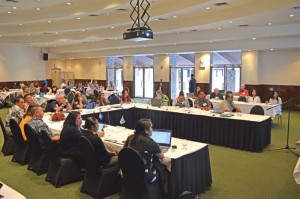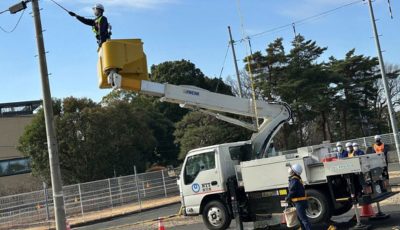PIHOA discusses NCD’s in Pacific

Members of the Pacific Islands Health Officers’ Association members along with employees from the Commonwealth Healthcare Center attend the 61st executive board meeting yesterday at the Fiesta Resort & Spa Saipan. (Erwin Encinares)
The growing threat of non-communicable diseases in the Pacific is so widespread that it was the main topic of discussion on the first day of the Pacific Islanders Health Officers Association meeting on Saipan.
According to Commonwealth Healthcare Corp. chief executive officer Esther Muña, the Secretariat of the Pacific Community, World Health Organization, and the Centers for Disease Control provide much needed support in the fight against NCD’s. The problem, however, is widespread throughout the region.
“The CNMI, just like Guam, is stumped. How do you lower the numbers?” asked Muña.
She believes that everything boils down to funding. With sufficient funding, treatment becomes more accessible and less taxing for the healthcare system—a wonderland that seems far beyond reach in the region.
“Across the world, in regards to funding, all of the numbers are going up. When you look at the Pacific, the numbers are just straight,” said Muña. That means the Pacific region gets less funding in the fight against NCD’s.
“It’s all about funding. There are a lot of challenges,” she added.
She cited the need for Hemoglobin A1c test, or HGBA1c test, for diabetics. The test is used to monitor the glucose level in the blood. The test is one of many to ensure blood glucose levels remain healthy It must be taken multiple times in a year, which Muña said is very costly.
“That in itself is very expensive,” she said.
That’s not including medical supplies. “We spend thousands of dollars almost everyday on medical supplies,” Muña said, adding that purchase orders for CHCC sometimes reach about $20,000.
“We all know that there is a problem and [CHCC] staff has done a lot of outreach on how to address it.”
Hosted this year by CHCC, the 61st executive board meeting of PIHOA at the Fiesta Resort & Spa Saipan will run for five days. It is being attended by health leaders across the Pacific, including members from Hawaii, Guam, American Samoa, Saipan, and the Freely Associated States, which include the Marshall Islands, Palau, and the Federated States of Micronesia.
FSM Health Secretary Magdalena Walters agrees that concern about NCD’s in the Pacific is growing.
“We didn’t used to have these problems. Now, we are facing problems such as diabetes, cancer, heart problems, hypertension, arthritis, and other problems. It is a big issue for us now,” she said.
Nationwide, the two leading causes of deaths in 2015 were heart disease and cancer; diabetes was ranked seventh.
According to statistics obtained from CHCC, for calendar years 2011-2014, there was a total of 491 recorded deaths caused by NCD’s, which translates to 65 percent of deaths for the period, with circulatory disease or heart disease leading. The three top causes of NCD deaths in the CNMI are cancers, endocrine, nutritional, and metabolic diseases, and diseases of the respiratory system, with total numbers for the period exceeding 50 for the latter two and a total of 133 deaths due to cancer.



























